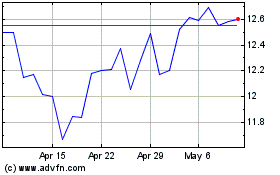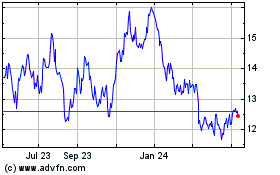An internal Rio Tinto PLC investigation raised questions about
whether company executives followed rules for paying people close
to government officials in foreign countries, a finding that helped
lead to the dismissal of two top officials this week.
The probe, which was related to a large payment to a consultant
of the company in the West African nation of Guinea, turned up no
evidence that top Rio Tinto executives were aware of any bribes
paid to Guinean government officials, a person familiar with the
matter said.
The abrupt firings this week of energy and minerals chief Alan
Davies , as well as head of legal and regulatory affairs Debra
Valentine, followed a review of internal Rio Tinto emails detailing
$10.5 million in payments made in 2011 to a consultant who helped
acquire rights to a massive iron-ore deposit in Guinea.
The dismissals sent shock waves through the British-Australian
mining giant's executive ranks, particularly angering allies of Mr.
Davies, who said he wasn't given a chance to defend himself,
according to people familiar with the matter.
The emails, which were reviewed by The Wall Street Journal, show
Mr. Davies asking permission from the company's then-iron-ore
chief, Sam Walsh, to make the payments to Franç ois de Combret, a
former Lazard Ltd. managing director.
Mr. de Combret had been helping the company negotiate with the
Guinean government to retain an iron-ore concession in the
country's Simandou mountain range, according to Mr. Davies's email,
and his services "were of the most unique nature," including
helping the company's communications with Guinea's president, Alpha
Condé . Mr. Condé was at the time being advised by Mr. de Combret,
a friend he had met in school in Paris, according to a person
familiar with the matter.
Mr. Walsh, who later became Rio Tinto's CEO in 2013, checked the
idea with Tom Albanese, the company's then-chief executive, who
gave the green light but warned Mr. Walsh to "think of the optics
to the [government of Guinea.]," according to the emails.
Both Messrs. Walsh and Albanese are no longer with Rio
Tinto.
The Guinean government wasn't notified by Rio or Mr. de Combret
about the payments to Mr. de Combret, a person familiar with the
matter said.
Mr. Albanese, currently CEO of India-focused miner Vedanta
Resources PLC, declined to comment. Mr. Walsh, who stepped down in
July, Mr. de Combret, and Ms. Valentine couldn't be reached.
Rio did retain the rights to Simandou deposits that year, though
it sold them this year to Aluminum Corp. of China for up to $1.3
billion.
An internal Rio Tinto investigation, which was conducted in the
past few months, aided by the Chicago law firm Kirkland & Ellis
LLP, raised questions about whether standard procedures and reviews
involving such payments were strictly followed, the person familiar
with the internal company probe said.
Such reviews typically entail referrals of details of the
payments and their recipient to internal compliance officers, among
other things.
Rio Tinto has said it has turned the emails and additional
information about the payments over to authorities in the U.K.,
Australia and the U.S. Law-enforcement agencies from the three
countries haven't said whether they are investigating.
In a statement Wednesday, Mr. Davies said Rio Tinto has "given
me no opportunity to answer any allegations" and that he has "been
left with no option but to take the strongest possible legal action
in response" to his dismissal.
Rio Tinto Chief Executive Jean-Sé bastien Jacques on Sunday
addressed the tensions simmering across the company, sending an
internal memo on Sunday, reviewed by the Journal, saying employees
are "shellshocked."
"Speculation is running in some quarters and some of what is
being said strikes at the heart of the culture and values of our
company," Mr. Jacques wrote.
The dispute highlights tensions between Rio Tinto's iron ore and
copper divisions. Mr. Jacques rose to power through the copper
unit, while Mr. Davies was a longtime iron-ore executive.
One of Mr. Jacques's first moves after taking over as CEO
earlier this year was to cancel Mr. Davies's Simandou project and
sell the assets. People familiar with the matter say some
high-level iron-ore employees have been angered by how Mr. Davies
has been treated.
Rio Tinto, like most big miners, has emphasized a renewed focus
on human-rights issues. In March 2015, Mr. Walsh, then Rio's CEO,
said in a speech in London that one of his most important
considerations is "the lives of our neighbors in the communities
and countries that host us."
Rio first secured exploration rights to Guinea's Simandou
iron-ore deposit in the 1990s, but was slow to develop it. In 2008,
the government stripped the miner of half of concession and awarded
it to BSG Resources Ltd., or BSGR, the mining business of Israeli
billionaire Beny Steinmetz. BSGR later struck a deal to sell a 51%
stake to Vale for $2.5 billion.
An investigation by Guinea's government later determined that
BSGR obtained the rights through corrupt dealings and stripped them
from the company. BSGR denies the allegations. Rio entered
negotiations to retain the rest of the concession, which it
concluded in 2011 in a deal that included a $700 million payment to
the Guinea government.
Write to Scott Patterson at scott.patterson@wsj.com
(END) Dow Jones Newswires
November 17, 2016 17:05 ET (22:05 GMT)
Copyright (c) 2016 Dow Jones & Company, Inc.
Vale (NYSE:VALE)
Historical Stock Chart
From Mar 2024 to Apr 2024

Vale (NYSE:VALE)
Historical Stock Chart
From Apr 2023 to Apr 2024
